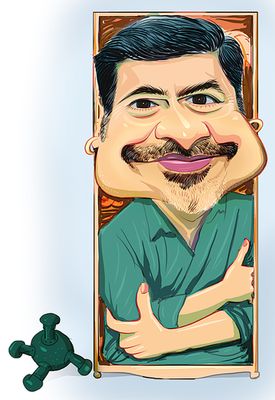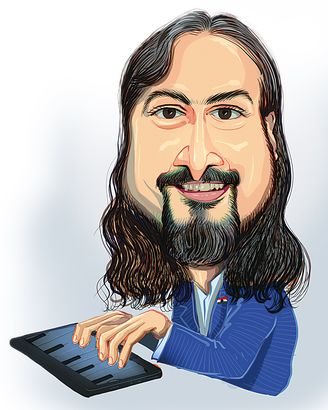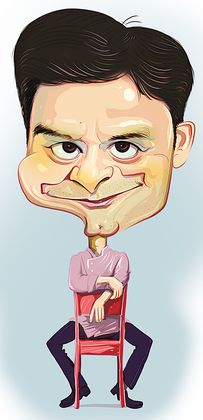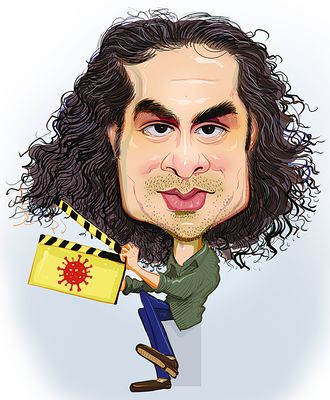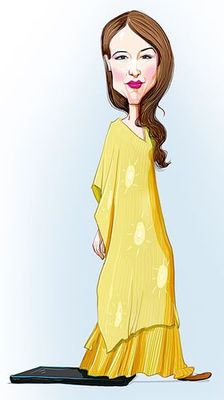For a while, it seemed like the world had drawn to a close, with offices shut, film releases getting indefinitely postponed and live music and fashion shows going online. We are facing such an unprecedented situation that it is difficult to conjecture what a post-Covid-19 world will look like. Still, one has to limp back to normalcy. So, we asked five industry experts from fashion, food, music, cinema and art on what they think is the future of their industries. Sometimes the best perspective is gotten amidst the worst crises. As the lyrics of a song by Brandi Carlile goes: “You can dance in a hurricane. But only if you are in the eye.”
SUDARSHAN SHETTY, artist and former curator, Kochi-Muziris Biennale
“NOW IS THE TIME TO BRING ART BACK TO THE IDEA OF ‘AVANT GARDE’”
Coming out of this, there ought to be something of an essential change in the way we look at the world and our place in it. This is the time to question the ways in which we have failed so far, and how we can proceed further.
I think the social need for ‘art’, as we see it now, is on the wane. There was a time when art produced information. Today, most art that you may see is secondary or dependent on the information that is [already] out there. This can be very conformist, so as to conform to a generally accepted notion or images of the dystopic times we live in. I think now, more than ever, is an artist’s responsibility to bring art back, if at all, to the idea of ‘avant garde’. To not only produce information that has transformative power for society at large, but also to find possible ways in which we can perceive the world outside or inside of ourselves.
The art industry, in the way it operates now, is not conducive to this approach, as it is tied inextricably to the market forces and is controlled by a very small group of people in the west. To begin with, we must stop playing ‘catch up’ with them. I hope this lockdown may help restructure some of the ways in which the industry and the art market are conducted.
I think that the internet can provide one way of dissemination. Right now, it seems to be the first response to the situation we find ourselves in, with museums and art spaces holding virtual tours and exhibitions. It would be interesting to see how artists respond in the future that may throw up some very interesting ways of dissemination of knowledge and vision outside of the internet.
RICKY KEJ, Grammy award-winning musician
“COLLABORATIONS ARE GOING TO BE KEY IN FUTURE”
Live concerts will be majorly impacted as people cannot come out in large gatherings. However, today, the technology just does not exist for musicians from different locations to get online streaming to fans [in a seamless way]. Just take Zoom—the audio quality is terrible. Even if there is half a second of latency, it can throw off a drummer or a percussionist. Because of the poor quality, you cannot charge money for online concerts. However, one can use the popularity they provide to make money through branded content or by coming up with advertising jingles for clients. Musicians will need to think very creatively to make money.
Pre-recorded concerts are a good option, if you have absolutely exclusive content for the audience and can offer a brand-new experience. Online concerts also open up the whole world for collaborations, which are going to be key in future. I can collaborate with a musician from another country in the same way I can collaborate with one two doors down my road.
Personally, 17 of my concerts in different countries have gotten cancelled. I have 16 albums streaming on various platforms; the royalty I get from them gives me a steady income. Many musicians whom I hire for concerts, though, have been really affected. The musicians who are going to thrive are the ones who are technologically adept. Things are going to be completely DIY (do it yourself).
CHEF MANU CHANDRA, chef partner, Olive group of restaurants
“BEING CLOSED FOR OVER 70 DAYS IS LIKE BEING STRUCK BY A METEOR. IT IS ARMAGEDDON”
These are desperate times. I see no silver lining. From what I can see, [even after restaurants reopen] people will want to wait before entering crowded spaces. This will have an overall impact on the whole eco-system of the restaurant industry and will determine whether it weathers the storm or perishes.
How is dining going to change? A lot has been written about digitised menus and servers wearing PPE suits. One thing seems to be piling onto another and the impact seems to be substantial. You take a hit if you are closed for 3 days. Being closed for over 70 days is like being struck by a meteor. It is Armageddon.
You have no choice but to introspect. After a point, introspection gives way and desperation takes hold. Will you be able to create a replacement model for what exists? It is not going to happen. So then what will happen? And what about the young, starry-eyed hotel management graduates? Lakhs of them entering the job market have nowhere to go. We were huge creators of demand. What’s going to happen to the families of our suppliers?
If this continues for another four to six months, 35 to 40 per cent of the restaurant industry is not going to survive. I see no light at the end of the tunnel yet. Only when every stakeholder is willing to work constructively and share the immense pain this has caused, will there be a glimmer of hope to overcome these extraordinary odds. It cannot be an option, but the new reality, till we return to the normal we knew.
IMTIAZ ALI, filmmaker
“THIS WILL LEAD TO SEVERAL IMPROVEMENTS IN THE FILM INDUSTRY”
We will face a lot of immediate problems—like how the infectiousness of the disease will affect the collaborative processes of film-making, shooting, post-production…. It seems like some form of shooting will begin in August-September. Then, the advantage will be to those whose films were half-made. Then to those who had not yet started filming. And finally, those films which were not yet sanctioned will get sanction. This means that the creative flow of our industry will have a lag of six months or so when it comes to production, even though people are writing a lot.
Despite all this, this period will result in several improvements in the next five years. First, when it comes to budgeting, things have been hyper-priced for long. The size of the units, for example, will be naturally controlled as a result of the pandemic. When you reduce the unit size, there will be more accountability and efficiency, as is there in the west. Secondly, filmmakers will take a re-look at their scripts. Focus on those things that were good but not ready, instead of those that were ready but not good. Thus, the general level of cinema will improve. Thirdly, the OTT space will really raise the bar of films that are produced. As filmmakers, we know that we have a space where our films can be placed; we can escape narrow-minded release strategies.
MANDIRA WIRK, fashion designer
“THE FUTURE IS DIGITAL, WITH MORE VIRTUAL APPOINTMENTS AND TOURS”
Things are going to change drastically in fashion. The future is digital. There are going to be more virtual appointments and tours of showrooms and garments. When it comes to the price point, there might be a pause on luxury and greater focus on comfort—more cotton and fabrics made in India. The emphasis is going to be on smart clothing that you can wear to meetings or to work, but nothing over the top. The artisans have taken a major hit. That is why we need to go back to our heritage and give importance to our tradition and culture.
With technology, we need to make the experience as personalised as possible. The customer will have to be included in each step in the process of making a garment, so that they know we are taking enough precautions in terms of safety and sanitisation. If a customer in London or California wants to know how a fabric feels, we must invest in courier services to send her samples. Earlier, maybe we were not so personally involved with our customers.


